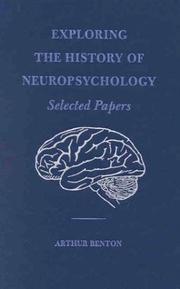| Listing 1 - 4 of 4 |
Sort by
|

ISBN: 1861561350 Year: 2000 Publisher: London Whurr
Abstract | Keywords | Export | Availability | Bookmark
 Loading...
Loading...Choose an application
- Reference Manager
- EndNote
- RefWorks (Direct export to RefWorks)
Agrammatism --- Aphasia --- Neurolinguistics

ISBN: 1280834676 9786610834679 0198031572 9780198031574 0195138082 9780195138085 Year: 2000 Publisher: Oxford ; New York : Oxford University Press,
Abstract | Keywords | Export | Availability | Bookmark
 Loading...
Loading...Choose an application
- Reference Manager
- EndNote
- RefWorks (Direct export to RefWorks)
Features essays which cover diverse aspects of the evolution of thought and practice in neuropsychology and behavioral neurology. This book places emphasis on the interplay of experimental and clinical approaches in advancing understanding of brain-behavior relationships. It is intended for neuroscientists.
Aphasia --- Clinical neuropsychology --- Neuropsychology --- Brain --- Language disorders --- Speech disorders --- Neurophysiology --- Psychophysiology --- Behavioral neurology --- Neurology, Behavioral --- Clinical psychology --- History. --- Diseases --- history --- History --- Neuropsychology - history --- Aphasia - history --- Neuropsychology - History --- Clinical neuropsychology - History --- Aphasia - History --- Dimension historique --- Neuropsychopathologie

ISBN: 1572305819 9781572305816 Year: 2000 Publisher: New York (N.Y.): Guilford
Abstract | Keywords | Export | Availability | Bookmark
 Loading...
Loading...Choose an application
- Reference Manager
- EndNote
- RefWorks (Direct export to RefWorks)
Aphasic persons --- Brain damage --- Aphasia --- Speech-Language Pathology --- Rehabilitation --- Complications --- rehabilitation --- diagnosis --- etiology --- -Brain damage --- -#KVHB:Afasie --- Brain --- Psychology, Pathological --- Aphasiacs --- Aphasics --- People with disabilities --- Diseases --- Wounds and injuries --- Patients --- #KVHB:Afasie --- Aphasic persons - Rehabilitation --- Brain damage - Complications --- Aphasia - rehabilitation --- Aphasia - diagnosis --- Aphasia - etiology

ISBN: 1282303872 9786612303876 1400831180 9781400831180 9780691004136 0691004137 Year: 2000 Publisher: Princeton, N.J. Princeton University Press
Abstract | Keywords | Export | Availability | Bookmark
 Loading...
Loading...Choose an application
- Reference Manager
- EndNote
- RefWorks (Direct export to RefWorks)
In the mid-nineteenth century, physicians observed numerous cases in which individuals lost the ability to form spoken words, even as they remained sane and healthy in most other ways. By studying this condition, which came to be known as "aphasia," neurologists were able to show that functions of mind were rooted in localized areas of the brain. Here L. S. Jacyna analyzes medical writings on aphasia to illuminate modern scientific discourse on the relations between language and the brain, from the very beginnings of this discussion through World War I. Viewing these texts as literature--complete with guiding metaphors and rhetorical strategies--Jacyna reveals the power they exerted on the ways in which the human subject was constructed in medicine.Jacyna submits the medical texts to various critical readings and provides a review of the pictorial representation involved with the creation of aphasiology. He considers the scientific, experimental, and clinical aspects of this new field, together with the cultural, professional, and political dimensions of what would become the authoritative discourse about language and the brain. At the core of the study is an inquiry into the processes whereby men and women suffering from language loss were transformed into the "aphasic," an entity amenable to scientific scrutiny and capable of yielding insights about the fundamental workings of the brain. But what became of the subject's human identity? Lost Words explores the links among language, humanity, and mental presence that make the aphasiological project one of continuing fascination.
Aphasia --- Brain --- Language disorders --- Speech disorders --- History. --- Diseases --- Language disorders. --- Dysphasia --- Communicative disorders
| Listing 1 - 4 of 4 |
Sort by
|

 Search
Search Feedback
Feedback About
About Help
Help News
News